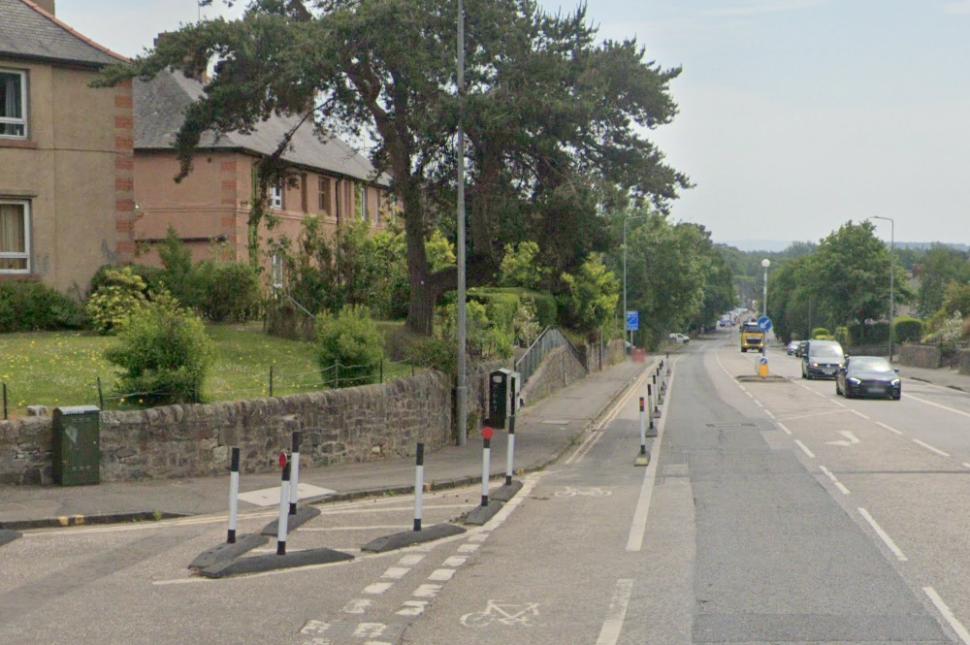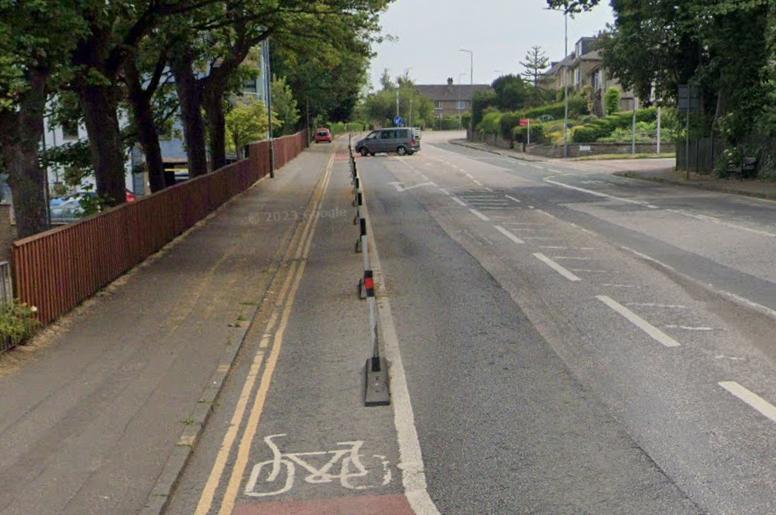Cycling campaigners in Edinburgh have secured an important victory for the city’s active travel infrastructure, after the council finally approved the decision to make permanent several of the Scottish capital’s temporary, bollard-protected cycle lanes.
With a looming deadline threatening the future of the cycle lanes, and following a protracted saga characterised by a series of delays and deferrals and a vocal campaign by local cyclists, in the end the decision to save the infrastructure was made within a matter of minutes, with very little in the way of debate.
The infrastructure in question was introduced during the pandemic, but with the Covid-era Experimental Traffic Order (ETRO) set to expire on 28 October, it was expected that today’s meeting of Edinburgh City Council’s TRO sub-committee would be the final chance to secure approval to make the bike lanes permanent.
The looming deadline prompted concern from frustrated cycling campaigners who felt, despite support from the council and its transport committee, that the meetings of the TRO sub-committee (a group formed fairly recently and who take the final decision on traffic orders) have “kicked the can down the road” for months.
Previous meetings in May and August saw no decision made, councillors having raised concerns about the cost of making cycle lanes permanent and the segregating bollards being a trip hazard.
Those delays prompted Edinburgh cycling campaign groups Spokes and Edi.Bike, along with 16 other local active travel groups, to write to councillors urging them to approve the ETROs.
And their campaign worked a treat, because during Thursday’s meeting of the sub-committee, the ETROs were made permanent within minutes, securing the future of the main road ‘Travelling Safely’ routes in the east, north, and west of the city. Orders for the south of the city will be put in front of the committee at a later date.
At what Spokes described as an “incredibly short meeting”, only one councillor, Liberal Democrat Kevin Lang, raised concerns about the protective materials used on the cycle lanes.
According to Spokes, Lang’s interventions at previous meetings were responsible for the deferrals which threatened the existence of the network. However, Lang’s queries were quickly defused, with the councillor informed that the current materials, while being safe, will be upgraded if the lanes are made permanent.
 Edinburgh cycle lane (credit: Google Maps)
Edinburgh cycle lane (credit: Google Maps)
A rolling programme of £2.5m over the next five years to upgrade materials has already been approved by the council’s Transport Committee, funding campaigners say should be more than enough for the committee to “overturn objections about the current materials in use, and preserve the essential segregated and safe routes in place and used by thousands across the city every day – in line with the council’s own City Mobility Plan”.
The rolling programme will gradually upgrade the existing bollards to more permanent materials, while also incorporating some useful improvements.
Remarkably, considering the delays that plagued the last few months, no other councillors spoke at all during the meeting, other than the committee’s convenor, Labour councillor Margaret Graham, who pointed out that the schemes have improved road safety, before moving the successful motion to make them permanent.
“An incredible meeting, decided in minutes after inordinate delays/deferrals at previous meetings,” Spokes wrote on BlueSky shortly after the decision was made.
“One intervention by councillor Lang, quickly disabused by officers. No one else spoke! The Edi.Bike/Spokes campaign has blindsided councillors!”
And Edi.Bike added: “Many thanks to everyone who joined us and Spokes in calling for scrutiny on this process and calling for sense to prevail at the TRO Sub-Committee.”
#TravellingSafely East Officer says 1. cash allocated to upgrade #ETRO routes 2. Order concerns traffic restrictions, not materials 🙄 Cllr Lang again queries the materials A: the materials are safe but will be upgraded if permanent No other councillors speak! 🤩 Report agreed! – East lanes saved!
— SpokesLothian (@spokes.org.uk) September 4, 2025 at 10:45 AM
Speaking to road.cc this afternoon, Spokes member Dave du Feu said: “Without the efforts of Edi.Bike, ourselves, 16 other local active travel organisations, and many individual Spokes members and others who contacted councillors, Edinburgh could well have lost the bollarded cycle lanes.
“They are now permanent, there is a costed programme for upgrading, and they will form the core of the City’s promised ‘Primary Cycle Network’ largely comprising segregated main-road bike lanes.”
Currently, the lanes use wands/bollards that will be familiar to cyclists across the UK, the segregating wand attached to a base. The safety of this design was questioned by Lib Dem councillor Lang in previous meetings, leading to concerns about cost of upgrading the infrastructure to a design which is not viewed as a trip hazard.
However, during their campaign, Edi.Bike pointed out the council’s own stats, which show no injury claims as a result of rubber kerbs since 2023, with the majority occurring when the schemes were brand new.
Spokes also argued the temporary cycle lanes have had no measurable negative impact on congestion, traffic flow, and have not caused a rise in injuries to pedestrians, cyclists, or drivers.
Their open letter to councillors also highlighted that several of the cycle lanes in question pass schools, the infrastructure having made children’s journeys to school safer and more accessible.
Speaking to us this earlier this week ahead of today’s decisive meeting, Edi.Bike called it “astounding” that the committee did not take into account the thousands of people who use and enjoy the cycling infrastructure, instead getting bogged down with statutory objections, of which “many are from angry motorists who perceive yielding a metre and a half of carriageway space an attack on their personal freedoms”.
“In reality, every bike passing in the lanes could have been another car in front of you making congestion even worse, and is it not brilliant that folk have a choice not to do that and move differently?” the spokesperson said.
“The only issues with them remain that folk don’t like the look of them, or feel that rising congestion due to the growth of the city is somehow attributable to protected cycleways – which monitoring data clearly shows is not the case.”
